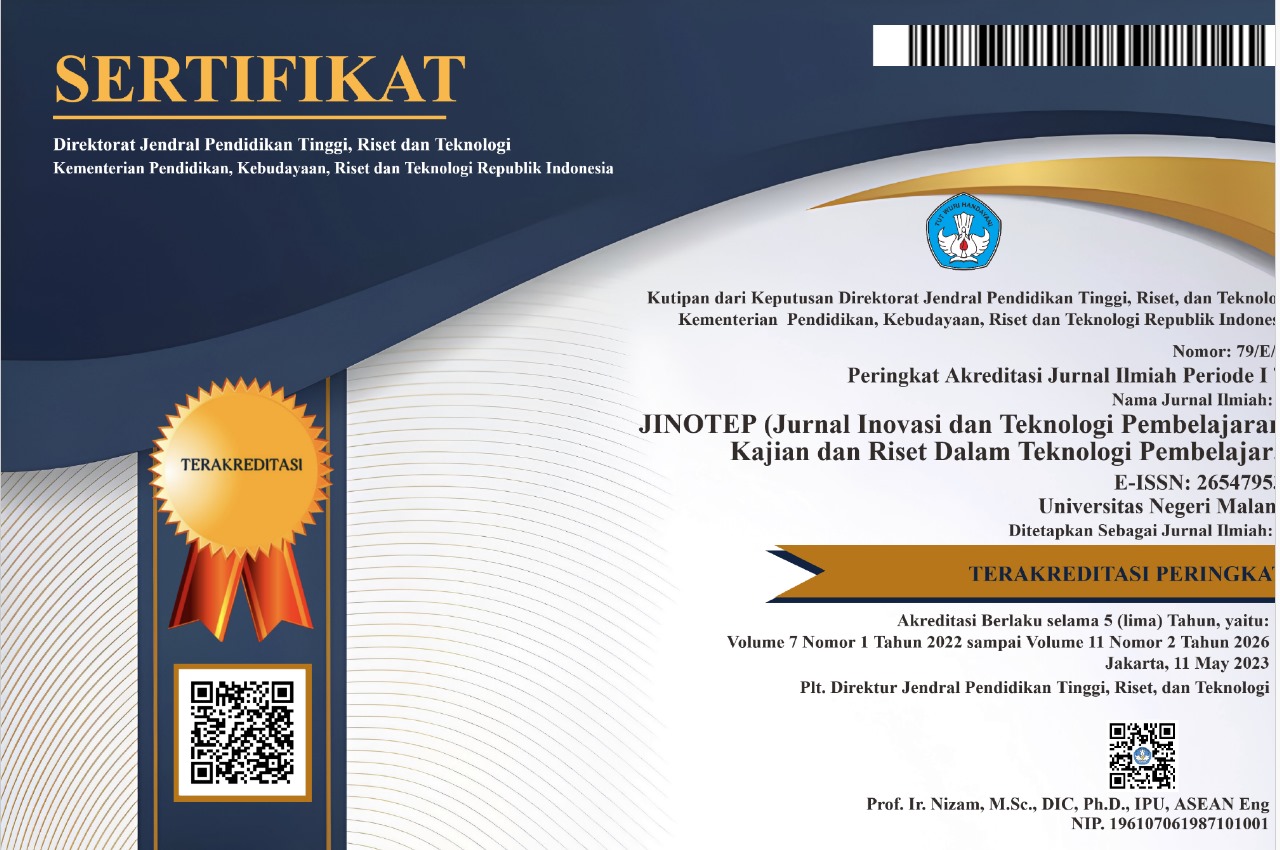The twelfth grade social science student’s independence learning in online Accounting learning
Abstract
Abstrak: Rendahnya kemandirian belajar siswa selama kegiatan pembelajaran online dapat menurunkan efektivitas capaian tujuan pembelajaran. Hal tersebut dapat terjadi dalam pembelajaran akuntansi. Akuntansi membutuhkan kemampuan ikhtisar, identifikasi, dan analisis akurat, oleh sebab itu dibutuhkan peran kemandirian belajar. Penelitian deskriptif kuantitatif ini dilakukan dengan tujuan untuk mendeskripsikan bagaimana kemandirian belajar siswa dalam kegiatan pembelajaran akuntansi secara online. Sampel penelitian ini sebanyak 139 siswa yang diambil menggunakan teknik sampling jenuh. Instrumen penelitian yang digunakan yakni observasi, wawancara, dan dokumen. Teknik analisis data menggunakan analisis persentase yang diklasifikasikan sesuai tingkat kategori dan disajikan dalam bentuk deskriptif. Hasil penelitian menunjukkan bahwa dari kelima aspek yang diukur, terdapat satu aspek kemandirian belajar yang rendah, yaitu kepercayaan diri. Rendahnya kepercayaan diri menghambat kelancaran kegiatan pembelajaran, karena suasana kelas yang kurang aktif mengakibatkan tujuan pembelajaran kurang tercapai secara maksimal. Hal ini membuktikan bahwa kemandirian belajar sangat diperlukan untuk mencapai efektivitas tujuan pembelajaran.
Abstract: The low independence of student learning in the online learning process can reduce the effectiveness of learning objectives achievement, including in economics (accounting) subjects. Accounting includes materials that require analytical skills, high identification, and effort. Therefore, more learning independence is needed to achieve maximum learning goals. This quantitative descriptive research aims to describe how big and to what extent students' learning independence is in online accounting learning activities. The sample of this study was 139 students taken using a saturated sampling technique. The research instruments used were observations, interviews, and documents. Data analysis techniques used percentage analysis classified according to category level and presented in descriptive form. The results showed that of the five aspects measured, one aspect of learning independence was low, namely self-confidence. Low self-confidence hinders the smooth running of learning activities because the classroom atmosphere is less active, so learning objectives are not achieved optimally. This proves that independent learning is necessary to achieve the effectiveness of learning objectives.
Keywords
Full Text:
PDFReferences
Akbari, O., & Sahibzada, J. (2020). Students’ Self-Confidence and its impacts on their learning process. American International Journal of Social Science Research, 5(1), 1–15. https://doi.org/10.46281/aijssr.v5i1.462
Amini, A., Prasetyo, T., & Yektyastuti, R. (2022). (2022). Hubungan antara pembelajaran daring dengan kemandirian belajar siswa selama pandemi COVID-19. SITTAH: Journal of Primary Education. 3(1), 45-59. https://doi.org/10.30762/sittah.v3i1.3
Andrias, A., Pratama, Y. A., Rais, R., Nurhasanah, M., & Alfiyanto, A. (2022). Principal’s strategy in developing student’s discipline. Lectura: Jurnal Pendidikan, 13(2), 260–272. https://doi.org/10.31849/lectura.v13i2.10585
Arikunto, S. (2019). Prosedur Penelitian Suatu Pendekatan Praktik. Aneka Cipta.
Astriani, E., Umi, S., & Widjaja, M. (2019). The Analysis of Independent Learning activities unit-based learning on Senior High School students. Classroom Action Research Journal, 3(3), 65–77. https://doi.org/10.17977/um013v3i32019p019
Auer, C. (2016). Conceptualizing political crisis and the role of public diplomacy in crisis communication research. The Handbook of International Crisis Communication Research, 7, 119–132. https://doi.org/10.1002/9781118516812.ch12
Aulia, A. N., & Apoko, T. W. (2022). Self-confidence and speaking skills for lower Secondary School students: A correlation study. JOLLT Journal of Languages and Language Teaching. 10(4), 551–560. https://doi.org/10.33394/jollt.v%vi%i.5641
Batubara, F., Derin, T., Putri, N. S., & Yudar, R. S. (2020). Five factors influencing the students’ motivation to learn English as a foreign language: A closer look into montessori classroom environment. REILA : Journal of Research and Innovation in Language, 2(2), 76–84. https://doi.org/10.31849/reila.v2i2.3165
Bicer, A. (2021). A systematic literature review: Discipline-specific and general instructional practices fostering the mathematical creativity of students. International Journal of Education in Mathematics, Science and Technology, 9(2), 252–281. https://doi.org/10.46328/IJEMST.1254
Budiono, A., Wiryokusumo, I., & Karyono, H. (2021). Pengembangan modul IPA berbasis literasi dan integratif dalam memfasilitasi belajar mandiri siswa. JINOTEP (Jurnal Inovasi Dan Teknologi Pembelajaran): Kajian dan Riset Dalam Teknologi Pembelajaran, 8(1), 58–67. https://doi.org/10.17977/um031v8i12021p058
Desmita, D. (2009). Psikologi perkembangan peserta didik. Remaja Rosdakarya.
Effendi, R. (2019). Accounting principles prinsip-prinsip akuntansi berbasis SAK ETAP. PT. Rajagrafindo Persada.
Estiyani, S. W., & Mahmudah, F. N. (2021). Strategies to increase discipline in distance learning. Indonesian Values and Character Education Journal, 4(2), 73–80. https://doi.org/10.23887/ivcej.v4i2.36126
Hasnida, N., Ghazali, C., Suppian, Z., & Zaini, S. H. (2022). Factors influencing students ’ motivation towards learning. Cakrawala Pendidikan Jurnal Ilmiah Pendidikan. 41(1), 259–270. https://doi.org/10.21831/cp.v41i1.45883
Heflin, H., & Macaluso, S. (2021). Student initiative empowers engagement for learning online. Online Learning Journal, 25(3), 230–248. https://doi.org/10.24059/olj.v25i3.2414
Hermansyah, H., Musahrain, M., & Ardianti, S. (2022). Students’ perspectives on virtual learning during the COVID- 19 pandemic. JINOTEP (Jurnal Inovasi dan Teknologi Pembelajaran): Kajian Dan Riset Dalam Teknologi Pembelajaran. 9(3), 211–218. https://doi.org/10.17977/um031v9i32022p211
Husain, B., & Basri, M. (2021). Pembelajaran e-learning di masa pandemi. Pustaka Aksara.
Linasari, R., & Arif, S. (2022). Pengaruh kemandirian belajar terhadap minat belajar IPA siswa kelas VIII SMP info. Jurnal Tadris IPA Indonesia, 2(2), 186–194. https://doi.org/10.21154/jtii.v2i2.874
Mak, M. H. C. (2021). Children’s motivation to learn at home during the COVID-19 pandemic: Insights from Indian parents. Frontiers in Education, 6, 1–7. https://doi.org/10.3389/feduc.2021.744686
Milheim, K. L., Fraenza, C., & Palermo-Kielb, K. (2021). Supporting student-initiated mobile device use in online learning. Online Learning Journal, 25(3), 267–288. https://doi.org/10.24059/olj.v25i3.2438
Mujiman, H. (2011). Manajemen Pelatihan Berbasis Belajar Mandiri. Pustaka Belajar.
Muksin, S. N. B., & Makhsin, M. B. (2021). A level of student self-discipline in E-Learning during pandemic COVID-19. Procedia of Social Sciences and Humanities, 278–283. https://doi.org/10.21070/pssh.v1i.59
Muqorrobin, M., Bindarti, W. E., & Sundari, S. (2022). Factors contributing to learners’ lack of self-confidence in speaking English. EFL Education Journal, 9(1), 27. https://doi.org/10.19184/eej.v9i1.30718
Nagauleng, A. M., & Waris, A. M. (2022). Independent learning in English online class during COVID-19 pandemic: Students perceptions and its challenges. English Review: Journal of English Education, 10(2), 737–748. https://doi.org/10.25134/erjee.v10i2.6421.
Nicolaides, M., Rallis, K., Eyskens, P. J., Andreou, A., Odejinmi, F., Papalois, A., & Sideris, M. (2020). A student initiative to improve exposure in research – dual benefit?. Annals of Medicine and Surgery, 56, 211–216. https://doi.org/10.1016/j.amsu.2020.06.033
Nugroho, P. W., & Maulana, M. A. (2021). Kemandirian belajar dalam pembelajaran jarak jauh. Advice: Jurnal Bimbingan Dan Konseling, 3(1), 10-15. https://doi.org/10.32585/advice.v3i1.1429
Nuryanto, A., & Ramadani, R. (2022). Learning independence and teacher teaching skills : Does it affect learning outcomes when face-to-face learning is limited. Jurnal Pendidikan Vokasi. 12(2), https://doi.org/110–116. 10.21831/jpv.v12i2.50603
Patras, Y. E., Sabti, N. B., Windiyani, T., & Hidayat, R. (2021). The effect of learning discipline on independence student learning. Pedagonal: Jurnal Ilmiah Pendidikan, 5(2), 70–79. https://doi.org/10.33751/pedagonal.v5i2.3937
Pradana, M., & Syarifuddin, S. (2021). The struggle is real: Constraints of online education in Indonesia during the COVID-19 Pandemic. Frontiers in Education, 6, 1–2. https://doi.org/10.3389/feduc.2021.753776
Prahenti, D., Rusijono, R., & Mariono, A. (2020). Pengaruh inkuiri terbimbing terhadap kemampuan mengidentifikasi sumber-sumber energi dan kemandirian belajar siswa Homeschooling. JINOTEP (Jurnal Inovasi Dan Teknologi Pembelajaran): Kajian dan Riset dalam Teknologi Pembelajaran, 7(2), 143–156. https://doi.org/10.17977/um031v7i22020p143
Rif ’at, M. F., Wati, M., & Suyidno, S. (2020). Developing students’ responsibility and scientific creativity through Creative Responsibility Based Learning (CRBL) in learning physics. Berkala Ilmiah Pendidikan Fisika, 8(1), 12-22. https://doi.org/10.20527/bipf.v8i1.7879
Sari, E. N., & Zamroni, Z. (2019). The impact of independent learning on students’ accounting learning outcomes at vocational high school. Jurnal Pendidikan Vokasi, 9(2), 141–150. https://doi.org/10.21831/jpv.v9i2.24776
Setiyono, S., & Fawzia, Y. Al. (2021). Responsibility and character education based on school culture. AL-ISHLAH: Jurnal Pendidikan, 13(3), 2784–2789. https://doi.org/10.35445/alishlah.v13i3.704
Surahman, E., Sulthoni., & Pratama, U. N. (2021). Online observation protocol to supervise online learning and its sample report. 7th International Conference on Education and Technology (ICET 2021), 601, 6–12. https://doi.org/10.2991/assehr.k.211126.027
Suyidno, S., Susilowati, E., Arifuddin, M., Misbah, M., Sunarti, T., &
Dwikoranto, D. (2019). Increasing students’ responsibility and scientific creativity through creative responsibility based learning. Jurnal Penelitian Fisika dan Aplikasinya (JPFA). 9(2), 178-188. https://doi.org/10.26740/jpfa.v9n2.p178-188
Wenbin, L. (2020). Research on factors influencing college students’ initiative in physical learning. Frontiers in Sport Research. 2(4), 4-6. https://doi.org/10.25236/FSR.2020.020402.
Yang, Y. (2022). Factors influencing the learning motivation in online course of second language teaching. Proceedings of the 2022 8th International Conference on Humanities and Social Science Research (ICHSSR 2022), 664, 406–410. https://doi.org/10.2991/assehr.k.220504.075
DOI: http://dx.doi.org/10.17977/um031v10i12023p043
Refbacks
- There are currently no refbacks.
Copyright (c) 2023 Zanisa Nadia Ditananda, Retna Ngesti Sedyati, Dwi Herlindawati

This work is licensed under a Creative Commons Attribution-ShareAlike 4.0 International License.
======================================================================
Jurnal Inovasi dan Teknologi Pembelajaran published by Universitas Negeri Malang in collaboration with the Asosiasi Program Studi Teknologi Pendidikan Indonesia (APS TPI) and Ikatan Profesi Teknologi Pendidikan Indonesia (IPTPI) with a MoU.
Publisher Address:
Educational Technology Laboratorium, Building D5, 1st Floor
Faculty of Education, Universitas Negeri Malang
Semarang St. No. 5, Malang City, East Java Province, Postal Code 65145
Email: jinotep.fip@um.ac.id
======================================================================

JINOTEP is licensed under a Creative Commons Attribution-ShareAlike 4.0 International License.
JINOTEP Statistics (Since July 13th, 2020)



.png)




.png)
1.png)
1.png)
4.png)
2.png)
1.png)
1.png)
.png)


_3.png)





1.png)
.png)